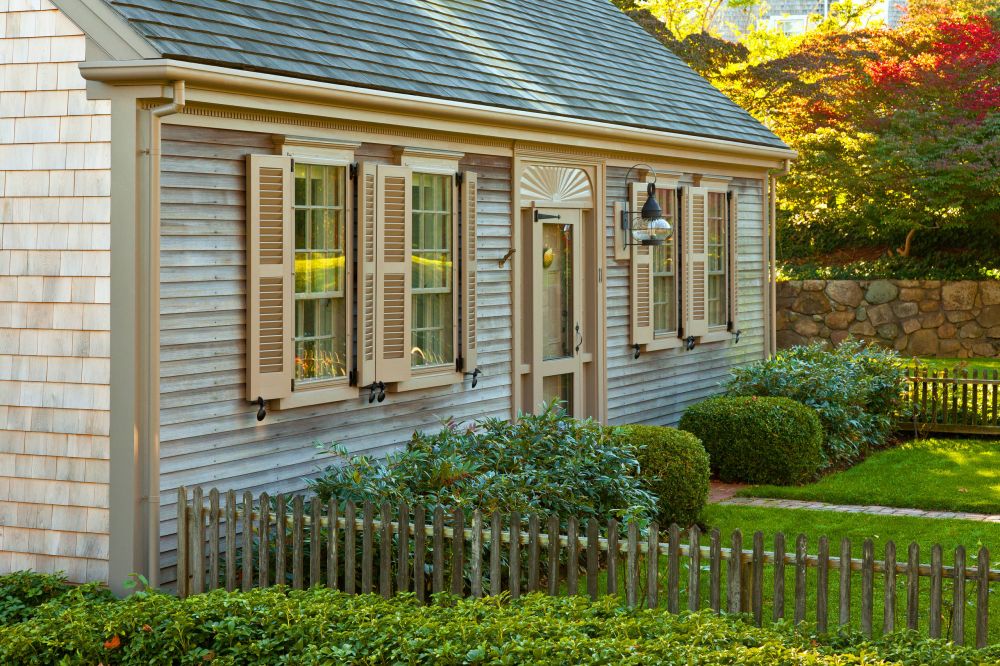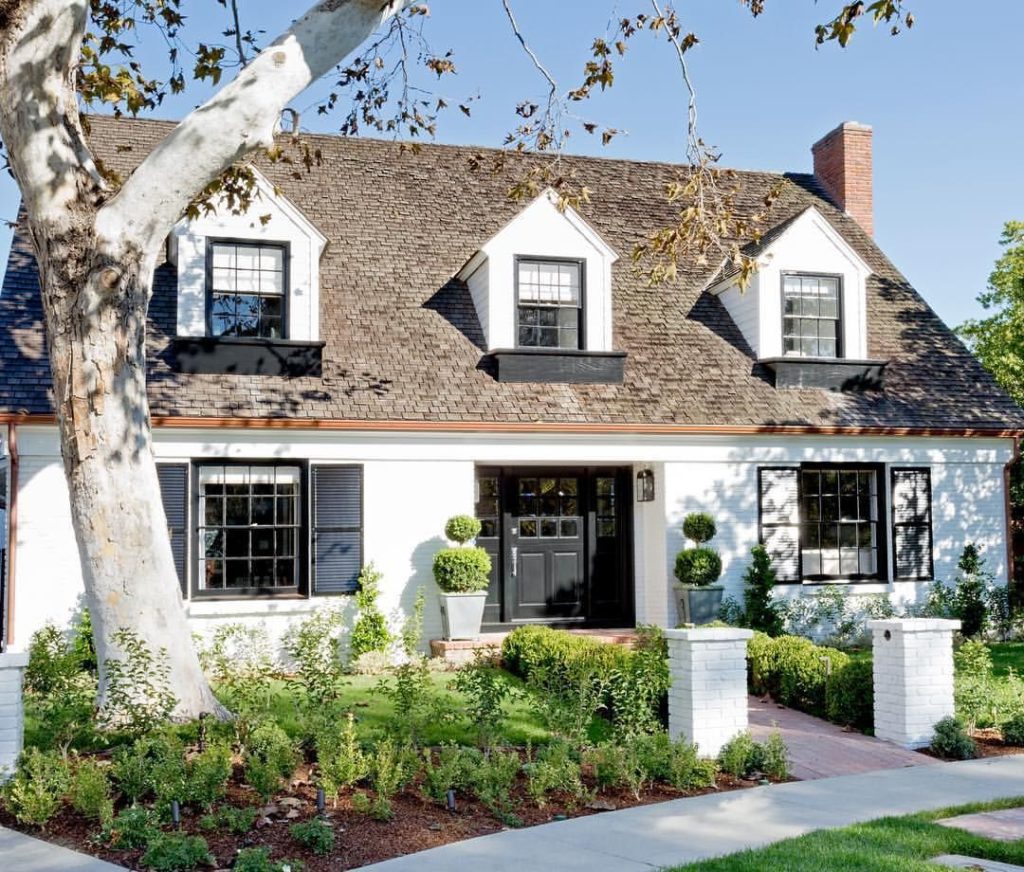| Published on
The Cape Cod house is a popular American architectural style. Characterized by its low, broad structure, either single or double-story, it features a steep-pitched gabled roof, a prominent central chimney, and minimal ornamentation.
The name Cape Cod coined in 1602 by Bartholomew Gosnold, is the ninth oldest English place name in the U.S. Timothy Dwight coined the term “Cape Cod House” when he was president of Yale in 1800.

Puritans coming from England to America in the 17th century began building wood cottages which were the early forms of Cape Cod homes. The harsh climate of New England forced the early builders to make adaptations to the hall and parlor house, a vernacular style popular in England. These craftsmen made their new cottages lower and with a square rather than a rectangular footprint. The new style was a one-and-a-half-story house with shingles or clapboard siding.

Builders used materials common throughout New England, including pine and oak for framing and flooring and cedar for the shingles and siding.
Builders also included features that would warm these homes during the long winters. They added large central fireplaces, chimneys, and low ceilings to conserve heat. They also added steep rooflines to keep them free of snow and water accumulation.
Cape Cod houses were the most popular style throughout New England from the mid-17th century until the early 19th century. Most Cape Cod homes were small, between 1,000-2,000 square feet.
Builders finished these homes with unpainted shingles, which sun-weathered to a gray color. Window size ranged for Cape Cod houses, with most from six to nine panes.
Early Cape Cod homes were symmetrical, with a front door in the center of the house and a large central chimney. The main rooms were on the first floor, with an unfinished loft above. Builders added little ornamentation like dormer windows and porches to early Cape Cod houses.
The Revival of the Cape Cod Style House
After declining interest in Cape Cods, the style once again grew popular as part of a Colonial Revival in architecture from 1930-1950.
Builders adapted the Cape Cod style houses into decorative and large homes for their wealthy clients. These adaptations included dormer windows to add light to the upper floors and larger floor plans.
Architects like Royal Barry Wills turned Cape Cods into efficient and modern homes for the emerging middle class. His adaptations included modern bathrooms, kitchens, and garages.
Cape Cods became a common style in the suburbs after World War II, including in the iconic Levittown communities. Developers modeled the Cape Cod suburbs after the first successful Levittown development in Long Island, New York, created by William J. Levitt and his brother Alfred.
Modern Cape Cods
Over the years, Cape Cod homes have morphed from very plain square structures to larger abodes. It was common to add wings to the basic square frame, either on the sides of the back, to accommodate space for modern amenities like garages and large dining areas.
If a traditional Cape Cod house had an attic bedroom, dormers might be added to provide more space and light to the second story. You might even find a porch on the front or back of a modern Cape Cod. All additions increased the living space of the home without taking away the charm.

Modern builders have adapted the Cape Cod style home to meet the needs of today’s families. Despite the modern adaptations, Cape Cod homes still have efficient designs and a timeless style. These exterior characteristics will help you identify historic and modern Cape Cod homes.
- Symmetrical Facade – Many Cape Cod houses have a symmetrical facade with a central door and an equal number of windows and/or dormers on either side.
- Steep Roofline – Cape Cod style houses have steep roofs so that snow and rain don’t build and cause issues with weight and moisture.
- Central Chimney – A central chimney was typical in early Cape Cod homes for heat and ventilation.
- Dormer Windows – Dormer windows are typical for Revival and modern Cape Cod homes to bring light and ventilation to the second story.
- Wood Cladding – Timber was inexpensive and plentiful in New England, so cedar clapboard and shingles were standard for Cape Cod exteriors. Wood is still the most common cladding type for modern Cape Cod houses. Builders left historic homes unpainted and had a weathered gray finish. Builders paint and stain modern Cape Cods to preserve the integrity of the wood.
- Shutters – Builders add shutters to protect the window glass during harsh storms. Many of the shutters today are not functional.
- Front Porches – Historic Cape Cods did not have front porches. Revival and modern Cap Cods have porches to expand the living space and make the exterior more decorative.

When a home is small, like some of the historic Capes, you need to think hard about the exterior design. Natural shingles can give your home the style of yesteryear and provide an eye-catching pattern.

In the past, Capes were all about symmetry. Keep this in mind as you update or build your Cape Cod house. Since dormers are modern, your home may have two or three, depending on its size.

Most Cape Cods feature shutters. The original versions were functional.

Of course, most of our shutters today are decorative. You can make your shutters bright and happy or go for a neutral look.

Many Cape homes have beautiful gardens with minimal lawns. Draw on the area you live in and make your front yard a field of wildflowers. Not only will it thrive, but your yard will be a safe haven for the bees and butterflies in the area.

If you prefer the more restrained and classic front yard, consider roses.

There is nothing like a Cape Cod home with a white picket fence. Whether you live in the country or in town, a picket fence will give you a nice border to edge your landscaping.

Some Cape Cod-style homes have a front porch, giving them a farmhouse feel. Embrace that space and make it a part of your living area.

Maybe you’re looking for a way to bring a little modern style to your old Cape house. You can never go wrong with black. Some black on the front door, shutters, and any trim around the house will give the whole facade a brand-new look.

If you want your Cape to feel like a vacation retreat, you’re going to have to partner with the neighbors. With similar siding and some climbing roses, your street will look like a vacation community, with or without the beach.
Frequently Asked Questions (FAQ)FAQ
What is a Cape Cod house?
A Cape Cod house is a classic style home design built with one or one and a half stories, with a high pitched roof, a central chimney, and a symmetrical design. Also, Cape Cods use building materials that weather well like cedar shakes with little decorative detailing.
Are Cape Cods good houses?
As stated, Cape Cods have a classical shape, and their design stands the test of time. Cape Cods, like all other homes, can be built with poor or good-quality construction material. A historic Cape Cod will use better quality material than newly constructed Capes.
Is a Cape Cod house a cottage?
A small house is referred to as a cottage. Many Capes are cottages in the sense that they are small; however, not all cottages are Capes.
Do Cape Cods have basements?
Most modern Cape Cods have basements. However, most historic Capes do not have a basement. Rather, they feature a bricked crawl space that has room for a few modern necessities like a water heater and electrical panel.
Are Cape Cods popular?
Cape style homes have been popular throughout history and remain popular today. They are a classic style house that has little ornamentation. Thus, these homes can be adapted to many different geographic contexts. Its versatility is one of the reasons that it will continue to be popular.
Is a Cape Cod two-story?
Most historic Cape homes were one story; however, many modern Capes have two stories with dormer windows built into the roof to bring added light to the second story.
How big is Cape Cod?
A Cape Cod will vary in size. Full Capes can be large with two stories and many rooms. However, the front of a full Cape is symmetric in its design. Many half Capes are the smallest versions of these homes. These were considered the starter houses in historic New England.
These style homes do not have a symmetric front. Three-quarter Capes also do not have symmetric front; rather they have two windows on one side of the door with one on the other.
However sometimes, the names full, half, and three-quarter have more to do with their front symmetry than their size.


